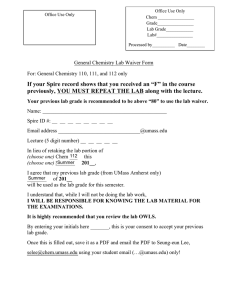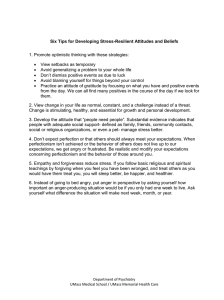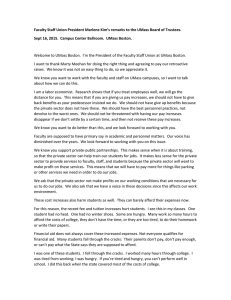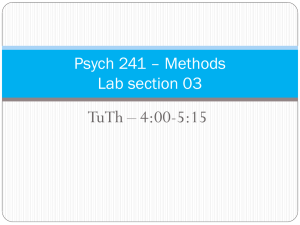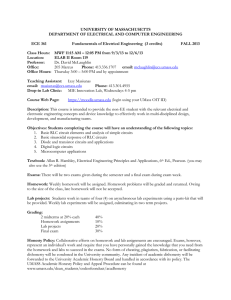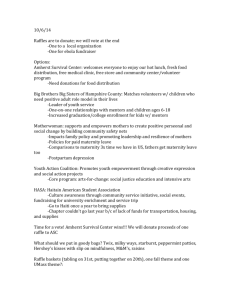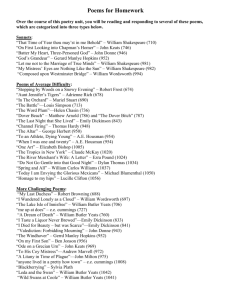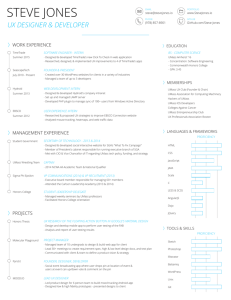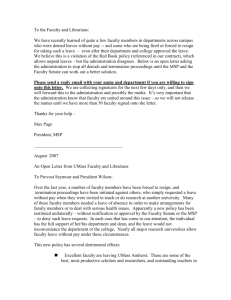1011225簡報Ppt0000003
advertisement
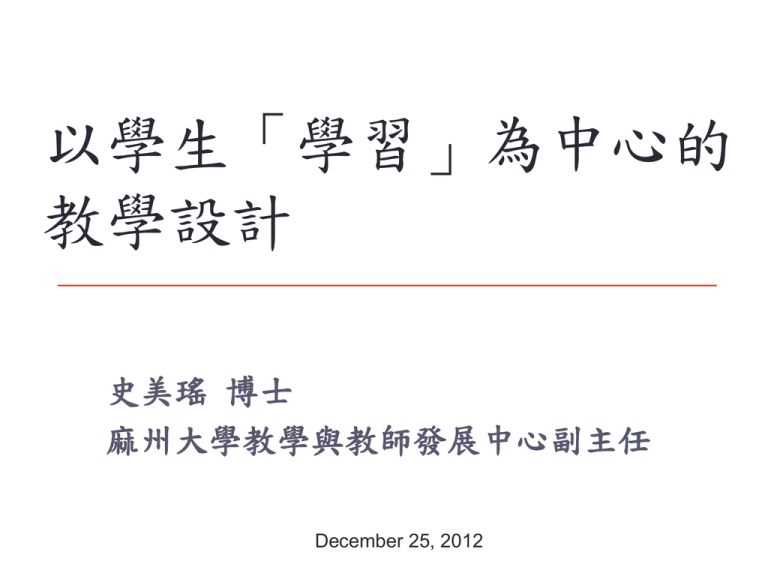
以學生「學習」為中心的 教學設計 史美瑤 博士 麻州大學教學與教師發展中心副主任 December 25, 2012 Who Are We? UMass Amherst Established in 1863 Fall 2012 Students = 28,236 undergraduates = 21,928 graduates = 6,308 Faculty = 1,235 (including 228 non-tenure system) Carnegie classification =RU/VH, public university Challenges #1 教與學之間的落差 #2 Outcome-Based Learning Assessment How much did students learn? Vs. What did student learn? #3 Indicators: (指標) Critical thinking skill Collaboration (team player) Scientific thinking Information literacy Integrated learner Are we teaching students these skills? How do we help students “learn” these skills? 以學生學習為中心的教學 教師的角色 - 教師如何教? 學生的責任 -學生怎麼學? 怎麼評量? 我們怎麼協助教師? 何謂「以學生學習為中心的教學」? 被動學習 主動學習 Teacher-centered Learning Student-centered Learning Low level of student choice High level of student choice Student passive Student active Power is primarily with teacher Power primarily with the student 這兩者是可以同在一條教學方式的連續線上 (continuum) 教師可以在不同的課程階段裡交互運用這兩種 教學方式 以學生學習為中心的「教學」是幫 助學生: 能連結過去、現在與未來的知識 參與自己的學習與評量 為自己的學習負責 學習不能假手於他 Tell me, and I’ll listen. Show me, and I’ll understand. Involve me, and I’ll learn --Lakota (Sioux) 學習理論 Students learn: 10% of what they read 20% of what they hear 30% of what they see and hear 70% of what they discuss with others 80% of what they experience personally 95% of what they teach to someone else Nolan, 1996 內化的學習過程 Experiences • Doing, observing • Actual, simulated • Rich learning experiences Information and Ideas • Primary/secondary • Access them in-class, out of class, online Reflection • What is learning and how one is learning • Alone and with others Adapted and modified from Dee Fink’s Teaching Improvement Model, 2003 以學生學習為中心的教學 (learner-centered teaching) 教師角色的改變 教師角色的改變 What is your role in student learning? To teach? To help students learn? What is your primary pedagogy? To cover necessary content? To uncover learning? 以學生學習為中心的教學 Step 1- 從課程設計開始 Ask yourself: What will your students be able to do, know, care about by the end of the course/lesson/unit? By the end of this modules: you (the student) will be able to: This course will cover: Recognize the structures of the heart The anatomy of the heart Critique one of Yeats’ poems A selection of Yeats poems So… 以學生學習為中心的教學 Step 2 了解學生學習此課程的背景(能力、動機) - Give pre- survey, first day ungraded quiz 提供學生此課程的GPS, e.g., 選修、必修,通識? - Identify the course goals, context 連結課程的相關性,學生的背景 - Provide connections of assignments, activities, assessments and course goals 以學生學習為中心的教學 Step 3 Interactive Lecture Step 3 (cont’d) Don’t lecture Know your students’ names Teaching with questions Various formats Minute paper (timely feedback) 以學生學習為中心的教學 • “Cheat Sheets” for each new lesson • Students develop a small group exercise, lab, or simulation every week • Small group discussions • Pairing test • Online discussion (blog, wiki) • Team-Based Learning 以學生學習為中心的教學 Step 4 Authentic Project/ Assignment/Assessment Authentic Project/Assignment/Assessment Focuses on what students should be able to DO in the future Focus on real-life context Has students imagine themselves in a situation where people are actually using this knowledge Focuses on the integrated use of skills 「學生」學習方式的改變 Reflection (alone or with others) What am I learning? What do I need to do in order to learn that? How am I doing? (What is my weakness and strengths?) Learning strategies (How do I learn better?) 評量」方式的改變 學生學習成效「 多元化的評量 多運用「評估表格」(rubric)、portfolio 使用不定期(periodic) 的評量,給予學生及時的 (timely)、期中性(formative)的回饋 學生自評及互評 (students involved in establishing evaluation criteria 幫助學生學習 COPE C onnection 連結 O pportunity 練習 P articipation 參與 E valuation 評估 幫助教師有效教學就是幫助 學生有效學習 教師發展中心的角色 • elicit faculty buy-in, support, resources 從個別的教師著手 協助教師掌握基本的教學技巧 多元化的評量教學成效 以學生學習為中心的教學設計 教師 學習成效 學生 評估 教學/教師 發展 教學環境 個案分享? 怎麼學? 怎麼評? 怎麼教? 怎麼幫助老師? A teacher's purpose is not to create students in his/her own image, but to develop students who can create their own image. - Author Unknown 提升教師的教學品質 提升大學教育的品質 Questions? Email: mshih@acad.umass.edu URL: www.umass.edu/ctfd
